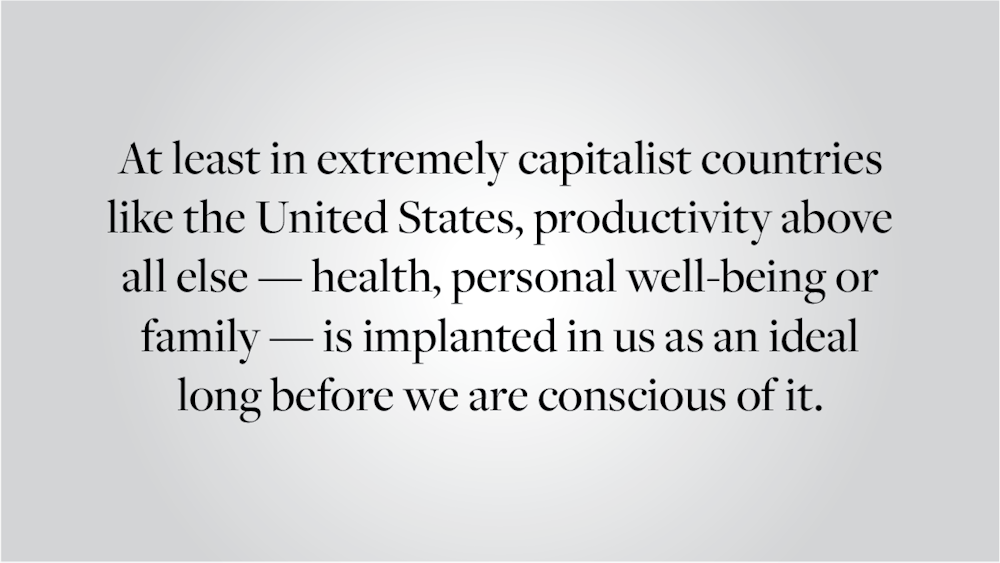It’s pretty normal on the Brown campus to brag about working long hours. Spending endless hours in the Rock, the SciLi or — heaven forbid — the CIT has become a badge of honor and a rite of passage. It might seem like lighthearted joking at first, but where do we draw the line between self-deprecating humor and the normalization of an unsustainable lifestyle that inevitably leads to burnout? The pervasiveness of “grind culture” on the Internet and in our daily lives has made it increasingly difficult to prioritize our health and wellness over productivity.
That same “grind culture,” encouraged and accepted by many professors and employers, pervades in settings far beyond college. The biggest example du jour is the recently-authorized strike by the International Alliance of Theatrical Stage Employees. IATSE is a union that represents over 150,000 workers in the film, television and theater industries across the United States and Canada. This union represents lighting and sound designers, costume designers, camera operators, writers’ assistants and many other behind-the-scenes crew. Long hours, often insufficient wages and volatile work environments are nothing new to them. However, as the pandemic has led to a large number of crew members quitting — and an ill-proportioned increase in pay from the streaming revolution for those who stayed — IATSE members across the country are now demanding their rights.
On Monday, union members voted to strike with 98.68% support, giving them greater leverage in negotiations with producers. They addressed fundamental abuses of IATSE workers’ rights: low wages, long hours, short rest periods, lack of compensation from new media like streaming services and poor health and pension plan funding.
The Instagram account @ia_stories has foregrounded crew work horror stories pervasive throughout Hollywood. The stories range from employees being forced to work 20-hour days without being able to switch out punch cards to working “Fraturdays” — Friday night shoots that spill into the wee hours of Saturday. Workers are commonly denied full weekends and expected to show up to work notwithstanding medical emergencies.
A widespread and all-too-normalized grind culture may make our society complicit in these abuses, but it’s the people in power who are capitalizing on it to exploit their workers. One anonymous crew member featured on @ia_stories had to work grueling hours while producers came and went as they pleased, prioritizing their own work-life balance and leaving subordinates in the dust. Crew members are often expected not to take time off of work for doctors’ appointments, leading to future medical issues, another submitter said. One assistant camera operator returned to work the day after a miscarriage, as per her superiors' expectations.
These stories are so normalized that they have become “badges of honor,” falling on deaf ears among not only producers and management, but also among a jaded American public. Like my acquaintances that brag about spending 12 hours in the Sun Lab at the CIT, Hollywood crew members consider harsh working conditions “part of the job” early in their careers — the price of participating in such a glamorous industry. Hollywood’s glitzy reputation masks the day-to-day realities of the workers that create this veneer in the first place. And complaining about blatant mistreatment, one could imagine, would elicit accusations of being “ungrateful” for landing a job in Hollywood. Only later in their careers might they be able to see their work environments for what they are: exploitative.
Even if grind culture is especially acute in Hollywood, it is an equally alarming trend among other young professionals — and college students — as well. Thus, when we zealously chase our professional dreams, we are all at risk of exploitation. And if we choose not to speak up when we can, we will perpetuate the system and perhaps become the exploiters ourselves.
The insidiousness of “grind culture” lies in its entrenchment in American culture. At least in extremely capitalist countries like the United States, productivity above all else — health, personal well-being or family — is implanted in us as an ideal long before we are conscious of it. Nevertheless, a more sustainable mindset is possible for us, as college students, before we enter the workforce. If we can learn to prioritize self-care and to stop romanticizing overwork, we can enter the workforce knowing our value, understanding our rights and building balanced lives even in the most stressful fields. That shift won’t end exploitation, but it will create less tolerance for it. The less we tolerate cultures of exploitation, the less they will be allowed to thrive.
Yasmeen Gaber ’23 can be reached at yasmeen_gaber@brown.edu. Please send responses to this opinion to letters@browndailyherald.com and other op-eds to opinions@browndailyherald.com.





